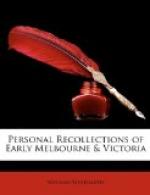The Melbourne races.
Those who delight in contrasts may follow me now to the Melbourne Races. Although not, in any sense or degree, “a racing man,” I could not forego this spectacle, so illustrative of the socialities and general progress of the colonists. This was a considerable occasion, as there were about 70,000 present; but it was not the grand “Cup Day,” an occasion which can muster 150,000. The grand stand here seemed to me, from my recollection, equal to Epsom and Ascot together. The racing was in admirable style, the horses generally taking hurdles and steeples without visible hitch in their pace. I used to have a racing theory which was confirmed here—namely, that the horse should never be allowed ahead, or at least for more than a yard or two, till close on the finish, because he thus loses the highest of the excitement, and is more amenable to fatigue. In one splendid race, of a dozen or more, on this occasion, one man, who came in far ahead at the first round, I predicted was to lose the race; and so it proved, for at the second and final round he came in only sixth or seventh.
The honour of the railway free pass.
Sixteen days of Melbourne life had pleasantly glided away, and we must needs be off, because we had the rest of Australasia to see, and a very brief term for accomplishing so great a business. Honours had been heaped upon us. How we are to take it when we tumble once more to the common level at Home I hardly know or like to think about. One of the most gratifying of these honours was the railway free pass, which Tasmania first sent us, followed by Victoria, South Australia, New South Wales, and Queensland. Later on I was accorded, through Mr. Labertouche’s kind agency, the golden key or pass over the Victorian lines for life, which I was assured was my due as one of the original members of the first Victorian Parliament. From my old friend of nearly forty years standing, Sir Henry Parkes, I had a courteous note to the effect that our railway comfort should be looked after so soon as we crossed the frontier. The honour of these things is, by infinity, greater than the mere saving of money. This is to be literally the case, for our daughter is already counting up these savings, with the intention of claiming them for kangaroo and opossum cloaks and rugs.
Albury.
We took the day train to Albury instead of the through night mail, so as to see Victoria, and have a few hours to spare to see Albury and its great wine business. We paid our respects to the Mayor of Albury, Mr. Mate, who, with Mr. Thompson, his son-in-law, showed us much attention; and we also inspected Mr. Fallon’s great wine vaults, and tasted some excellent wine, including the pale, delicate tokay. Albury, with its population of 8,000, reminded me of Melbourne about 1845. There was an air of comfort and prosperity all about, and a leisurely way of it, which contrasted pleasantly with the hurry and bustle of larger places.




